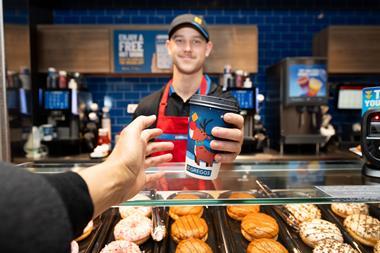Brioche’s monopoly of the UK burger bun scene could be under threat as a growing number of challengers wait in the wings, vying for consumers’ attention.
For some, the bun is an afterthought, merely a carrier for the meaty burger or, increasingly, the vegan patty inside. For others, it offers a point of difference, a chance for premiumisation.
“The burger bun is key element in accentuating the ingredients and cooking methods used,” explains Simon Dukes aka Burger Lad and a member of Lantmännen Unibake UK’s Americana Burger Board.
“Not only is the bun the first thing customers see when they look at a burger, but it makes up 69% of the overall build, so it’s essential to consider its quality.”
There are many options for foodservice operators and consumers to choose from, including the Americana Grill Marked Burger Bun to the Cheese-Topped and Cheese & Bacon-Topped Buns that are part of New York Bakery Co’s out-of-home range.
“Anything that allows consumers to customise and trade up their burger will drive up value. More flavoured and coloured buns have been appearing in the market such as beetroot buns,” says Philippa Knight, marketing manager for out-of-home at New York Bakery Co.
“Carriers that offer a point of difference will also prove popular this year. Consumer research for New York Bakery Co highlights that when choosing breads out of home, consumers are more likely to choose seeded and cheese-topped breads.”
But there are a host of bread-based carriers looking to give buns a run for their money. Introducing the burger bun challengers…
Bagels
The New York classic has won over the nation when it comes to out-of-home dining experiences and could make its mark on the UK burger scene as well.
Asda and McDonald’s are two companies to jump on the trend. Asda introduced the Extra Special Donut Beef Burger – a burger with a hole in the middle – as part of its summer 2019 range. Notably, the serving suggestion for them is in a sesame seed bagel (pictured above).
McDonald’s, meanwhile, introduced The New York Stack as part of its 2019 Great Tastes of America promotion, which features two beef burgers, bacon, cheese, slaw and mustard, housed in a sesame and poppy seed-topped bagel.
However, some are hesitant about their use in burgers. “When we looked at the burger bun market it was evident that our authentic bagels were a little too chewy for burgers,” explains NYBC’s Knight.
Bao buns
Bao buns, along with other steamed breads, have exploded in popularity in the out-of-home market.
There has been a recent spate of new restaurants opening which feature them on menus, from Buns & Buns in Covent Garden to a second site from Chinese street café Bun House in London’s Chinatown
“Baos are fantastic for mopping up sauces too, and generally they are a great alternative to anything bread-like that you might use for an everyday BBQ,” explains Jeremy Pang, founder and head chef at School of Wok – an Asian cooking school in London.
“The best thing about baos is that they’re just like a burger or sandwich – it’s an open bit of bread so you can practically put whatever you want inside.”
When it comes to fillings, Pang recommends slow-cooked (barbecued or roasted) pork neck or shoulder or a glazed miso aubergine for a vegetarian option. To aid consumers with this at home, School of Wok launched a duo of bao bun kits into the grocery sector last year.
For further proof of bao’s potential, Asda’s head development chef Mark Richmond used them as a carrier for the Extra Special Ultimate Wagyu Hot Dog Sausages at the Spring/Summer preview event.
Pretzel buns
German pretzel buns combine the chew of a pretzel with the practicality of a burger bun.
“Brioche is our bread and butter, which is what’s expected when it comes to this type of barbecue, but the idea of a pretzel bun is starting to grab people’s attention,” notes Vladimir Hromek, executive chef at Cambridge barbecue restaurant Smokeworks.
While not available at Smokeworks yet, the inspiration comes from the Smokeworks Tap which serves pretzels as a snack alongside beer, bourbon and cocktails.
“We’re seeing a few other restaurants start to do use pretzel buns, so I think more will consider it in the future. They’re delicious but they’re not easy to make, meaning volume is an issue and the price point is still too high as it’s a niche product,” he adds.
Croll
“The croll is set to shake up summer barbecues,” pronounced Lidl earlier this month as it unveiled its latest in-store bakery innovation in the form of a croissant/roll hybrid.
Priced at 49p, Lidl says its croll (pictured above) combines the taste and texture of a croissant with the structural hold of a bread roll, making them easier to slice and fill with sweet or savoury fillings.
“This summer we want to help our shoppers get big on barbecues,” said Richard Inglis, head of buying at Lidl. “ The croll is a deliciously versatile creation, which is sure to add the ‘wow’ factor to summer entertaining.”
Lidl isn’t the only one eyeing the croll for growth. Back in 2017, New York Bakery Co launched one as part of its foodservice range and now it’s hoping to take it to the next level by tapping demand for vegan-friendly products – a trend it doesn’t see slowing down any time soon.
“Carriers that help operators deliver great vegan dishes will definitely gain traction. The vegan trend has led bakers to launch vegan brioche-style buns which use dairy free alternatives to butter and eggs to help operators meet this increasing demand,” says Knight.
“This year New York Bakery will be making the croissant roll hybrid ‘croll’ suitable for vegans, as it’s slightly sweet flavour and light but robust texture makes it perfect for burgers.”
Cornbread
It’s not technically a challenger to the burger bun, but some believe the American barbecue side dish could make headway on the UK scene.
At present, it hasn’t ventured much beyond appearing as a side dish at a handful of US-style barbecue restaurants in the UK. London chain Bodean’s, for example, has cornbread muffins on its menu while a blue cheese cornbread with jalapeño butter is served at Smokeworks.
“Cornbread is a Marmite product,” says Hromek. “Some people love it, some hate it, and some won’t even consider it.”
That doesn’t mean cornbread doesn’t have potential. Hromek suggests encouraging staff to upsell by recommending it as an interesting side dish or starter encouraging people to at least try it.
Quality, he believes, also has a lot to do with Brits’ perceptions of the product. “There is a lot of bad cornbread out there. If it’s not treated well, it can be a poor-quality product. We make ours in-house, we serve it toasted and, as a result, we do sell quite a bit of cornbread.”
































No comments yet